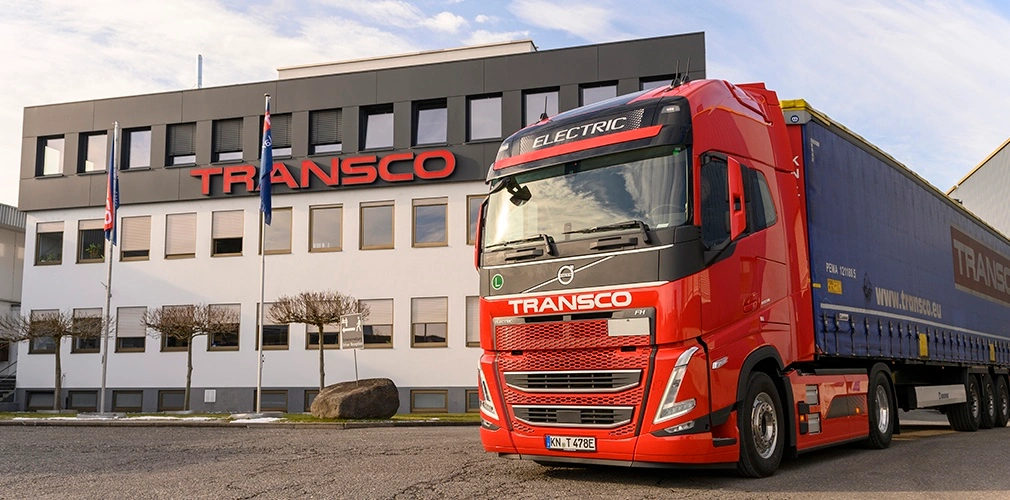“The increase in tolls as the sole source of income, the sudden abolition of all subsidies, and the exemption of tolls for eTrucks only until the end of 2025 are measures that do not provide security or predictability in Germany,” states Transco.

In this context, in a dialogue with Mobility Portal Europe, Marko Mustapic, Head of Branch at Transco GmbH, emphasizes: “We absolutely need reliability in politics.”
The medium-sized, family-managed logistics company based in Singen, Baden Württemberg, Germany, currently operates a fleet comprising 75 tractor units and 330 trailers.
Of these, six trucks are electric, representing approximately ten per cent of their fleet in the country.
They opted for Volvo vehicles, which boast a power of 600 horsepower (HP), providing an approximate range of 250 kilometers.
“This means that their use is still technically limited to regional transport, such as factory round trips for major customers, transports to and from Switzerland, and for pre-carriage and onward
carriage to combined transport terminals,” details Mustapic.
To “refuel” these trucks, they currently utilize public charging points located around their company site.
Meanwhile, the construction of infrastructure at their Singen headquarters is in its final phase, and they are planning to install more stations at other branches.
However, Mustapic emphasizes that it would be ideal if they could also find “appropriate charging infrastructure at our route destinations.”
“This would allow loading and unloading times to be used to charge the vehicle batteries and our processes would become more efficient,” he explains.
For this purpose, since 2016, Germany has had the German Charging Station Regulation (LSV) issued by the Federal Ministry for Economic Affairs and Energy (BMWi), which has been updated several times since then.
This regulation sets technical requirements for charging infrastructure, access rules for electric vehicle users, and the provision of information on “refueling” processes.
Its aim is to accelerate the expansion of public access points, which must meet certain standards to ensure smooth and safe use, in order to promote the adoption of eCars.
This is now supplemented by the Alternative Fuels Infrastructure Regulation (AFIR) established by the European Union, which also aims to promote alternative fuels and develop relevant infrastructure.
According to Transco, the implementation of this regulation “is an important step towards climate neutrality.”
“However, there are still some questions that need to be answered in order to make the topic more economically attractive,” says Marko Mustapic.
At the same time, he stresses: “To make electromobility or alternative drive systems more attractive for transport logistics, the charging infrastructure must be massively expanded.”
It is worth mentioning that recently, the German Federal Minister of Transport, Dr. Volker Wissing, has promised to support the expansion of corporate charging network with 150 million euros.
Additionally, environmentally friendly trailers will be subsidized with 60 million euros.
In this context, the sector insists that climate targets in transport can only be achieved if the revenue from the CO2 levy is reinvested in direct subsidies for vehicles and components, as well as in charging stations.
What are Transco’s eMobility plans?
In addition to deploying their six electric trucks since the beginning of this year, the company’s fleet expansion “is already being planned.”
“In the future, I see a drive mix in our company and in the entire industry,” anticipates the Head of Branch.
In this regard, Transco will deploy its eVehicles on defined routes with appropriate charging infrastructure.
However, it does not rule out the possibility of using hydrogen-powered cars, although it notes that the costs of this technology “still have to fall significantly and availability must be guaranteed.”

About Transco
The German firm offers a wide range of transportation and logistics services to clients in various industries, B2B, and B2C.
Its service portfolio also includes e-fulfillment solutions, customs clearance, and special transports for the food and pharmaceutical industries.
Currently, the Transco Group has 25 locations in nine countries and employs around 700 people.
Transco GmbH, the group’s parent company, was founded in 1970 and is represented by CEO Christian Bücheler.
Its annual turnover in 2023 was 125 million euros.








